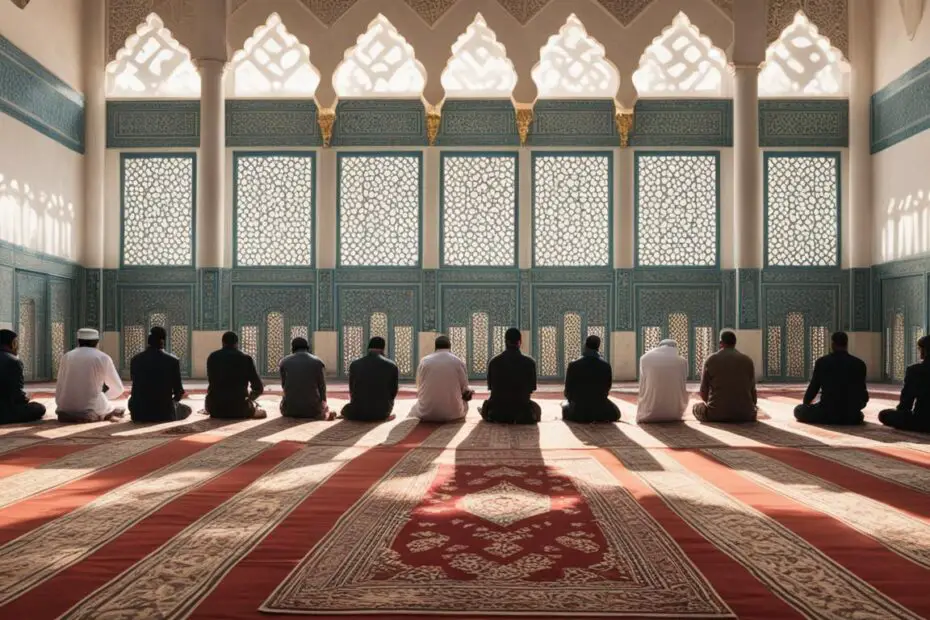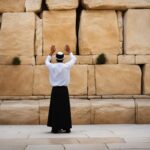Prayer holds immense significance in Islamic culture, woven into the fabric of daily life and deeply rooted in Islamic traditions. For Muslims around the world, prayer is not just a ritual but a spiritual journey that strengthens their connection with Allah and their community. Understanding the rich Islamic prayer practices and the role they play in the lives of Muslims is key to appreciating the beauty and devotion behind this integral aspect of Islamic culture.
Key Takeaways:
- Prayer is a vital element of Islamic culture, promoting spirituality and a deep connection with Allah.
- The five daily prayers, performed at specific times, are a cornerstone of Islamic prayer practices.
- Islamic prayer rituals involve specific movements and recitation of Arabic prayers from the Quran.
- Respecting prayer etiquette, focus, and humility are essential during prayer in Islamic culture.
- Prayer fosters a sense of community, unity, and support among Muslims around the world.
The Significance of Prayer in Islamic Culture
In Islamic culture, prayer holds immense importance as a means of deepening one’s relationship with Allah and seeking guidance and blessings. It is regarded as a form of worship, an act of complete submission to Allah’s will. Through prayer, individuals experience spiritual growth and find solace in times of difficulty.
Prayer customs may vary across different Muslim communities and countries. However, the core belief in the importance of prayer remains constant. Muslims engage in this sacred practice to connect with the divine, align their hearts and minds with Allah’s teachings, and seek His mercy and forgiveness.
Islamic prayer is not just a routine recitation of words; it is an act of devotion that encompasses physical movements, recitation, and deep reflection. It is a moment of surrender and humility before the Almighty. The rhythmic prostrations and supplications during prayer create a spiritual atmosphere that nourishes the soul.
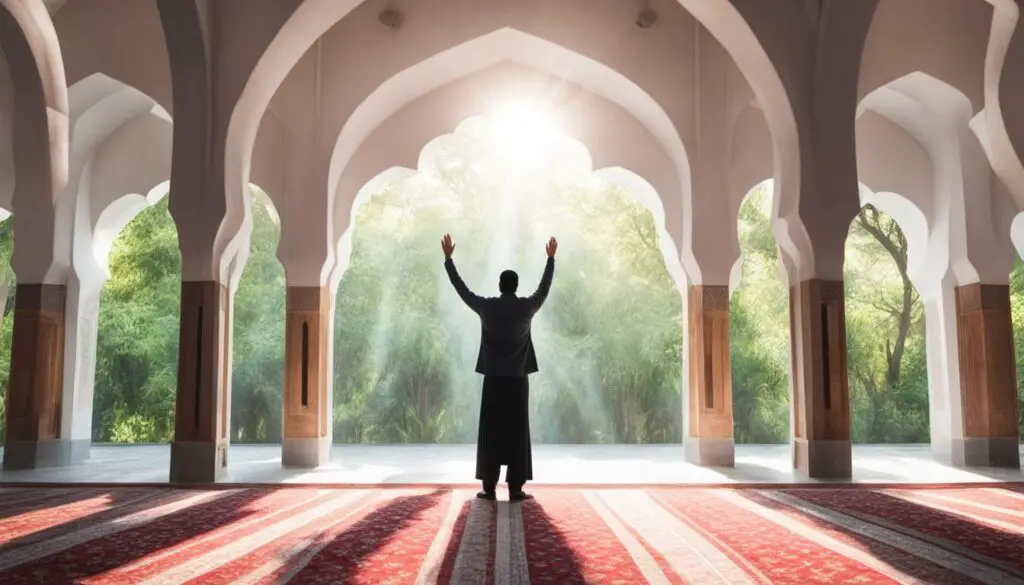
In Islam, prayer is not limited to individual worship but is also practiced collectively in mosques, creating a sense of unity within the Muslim community. This collective worship not only strengthens the bond between individuals but also fosters a shared connection with Allah.
The significance of prayer in Islamic culture extends beyond the act itself. It permeates every aspect of a Muslim’s life, promoting moral values, self-discipline, and mindfulness. Prayer cultivates a sense of gratitude, compassion, and empathy, shaping individuals into better human beings.
“Prayer is not just asking Allah for what you want; it is also thanking Him for what you have.”
Through prayer, Muslims seek spiritual fulfillment, guidance, and blessings in every aspect of life. It is a means to find peace, solace, and strength in times of adversity. Prayer is the pillar that upholds the Islamic faith, reflecting the deep-rooted devotion and love for Allah.
| Prayer | Meaning | Benefits |
|---|---|---|
| Fajr | Dawn prayer | Starts the day with devotion and seeking blessings |
| Dhuhr | Noon prayer | Refreshes and renews focus in the midst of the day’s activities |
| Asr | Afternoon prayer | Provides a moment of reflection and gratitude before the evening |
| Maghrib | Evening prayer | Brings peace and tranquility after the day’s challenges |
| Isha | Night prayer | Concludes the day with a sense of spiritual connection and protection |
Prayer in Islamic culture is not merely a religious obligation; it is a transformative and empowering practice that shapes the lives of millions of Muslims worldwide.
Islamic Prayer Practices and Rituals
Islamic prayer practices encompass a set of specific rituals and movements that hold deep significance for Muslims. These practices are rooted in the teachings of the Quran and the traditions of the Prophet Muhammad.
A crucial aspect of preparing for prayer is the ritual of ablution or Wudu. Wudu involves cleaning certain parts of the body to achieve purification before engaging in prayer. By performing Wudu, Muslims strive to attain a state of physical and spiritual cleanliness, which enables better focus and connection during prayer.
During prayer, Muslims follow a sequence of movements that include standing, bowing, prostrating, and sitting. These movements are known as Rak’ahs and are performed in sets depending on the specific prayer. With each movement, worshippers recite specific Arabic prayers from the Quran, expressing their devotion and seeking Allah’s blessings.
Prayer etiquette in Islam emphasizes the utmost respect, focus, and humility during prayer. Muslims are encouraged to find a clean and suitable space for prayer, ensuring they are dressed modestly and respectfully. The environment should be free from distractions to maintain the sanctity of the prayer experience.
Prayer serves as a means of deepening one’s connection with Allah and seeking spiritual growth. It is a time of reflection, repentance, and gratitude. By following the prescribed rituals and adhering to prayer etiquette, Muslims aim to enhance their spiritual journey and draw closer to their Creator.
Islamic Prayer Movements
| Prayer Movement | Description |
|---|---|
| Standing (Qiyam) | Begin the prayer by standing, facing the Kaaba in Mecca, with hands raised and reciting Takbir (Allahu Akbar – God is the Greatest). |
| Bowing (Ruku’) | Bend from the waist, placing hands on knees, and recite praise to Allah, known as SubhanAllah (Glory be to Allah). |
| Prostration (Sujood) | Lower the forehead, nose, hands, knees, and toes to the ground, reciting supplications and praising Allah. This is the closest position to Allah and represents complete submission. |
| Sitting (Julus) | Assume a sitting position, with knees and feet on the ground, while reciting specific prayers and seeking blessings from Allah. This position is performed between the sujood (prostrations). |
These movements are repeated in each Rak’ah, with variations depending on the specific prayer being performed. The precise execution of these movements is a vital aspect of Islamic prayer, symbolizing reverence and submission to Allah.
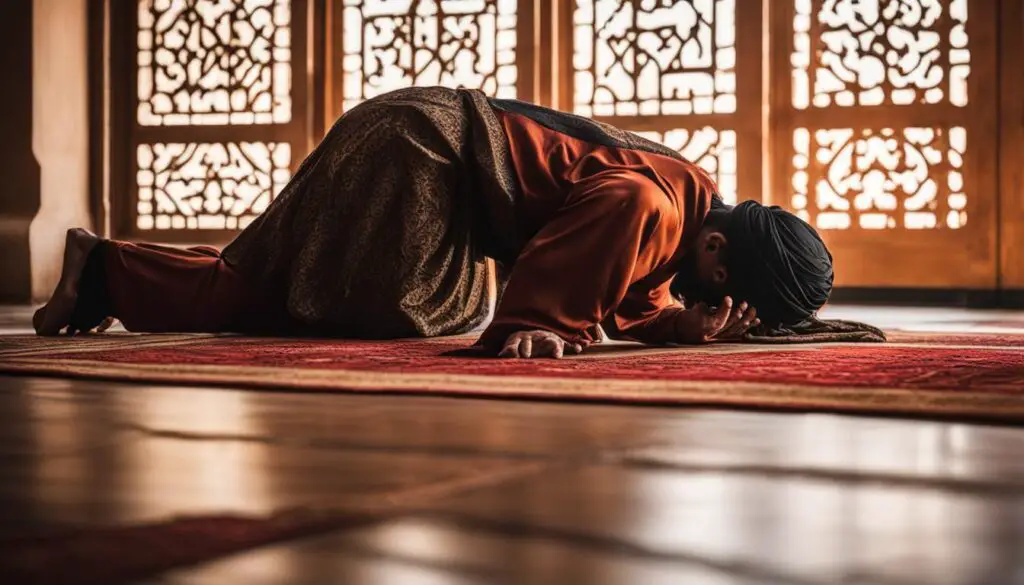
Islamic Prayer Times and Schedules
In Islamic culture, prayer holds a central position, with Muslims required to observe prayer five times a day. These prayer times are closely tied to the position of the sun and are observed at specific intervals throughout the day. Adhering to the designated prayer times is considered a sacred duty and an essential part of the Islamic faith.
The five daily prayers, known as Salah, are observed at the following times:
- Fajr – Dawn prayer before sunrise.
- Dhuhr – Mid-day prayer after the sun has passed its zenith.
- Asr – Afternoon prayer before sunset.
- Maghrib – Evening prayer immediately after sunset.
- Isha – Night prayer after twilight has disappeared.
The specific timing of these prayers may vary depending on the geographical location, as the times are determined by the movement and position of the sun. Muslims consult prayer timetables or use smartphone applications that provide accurate prayer times according to their location.
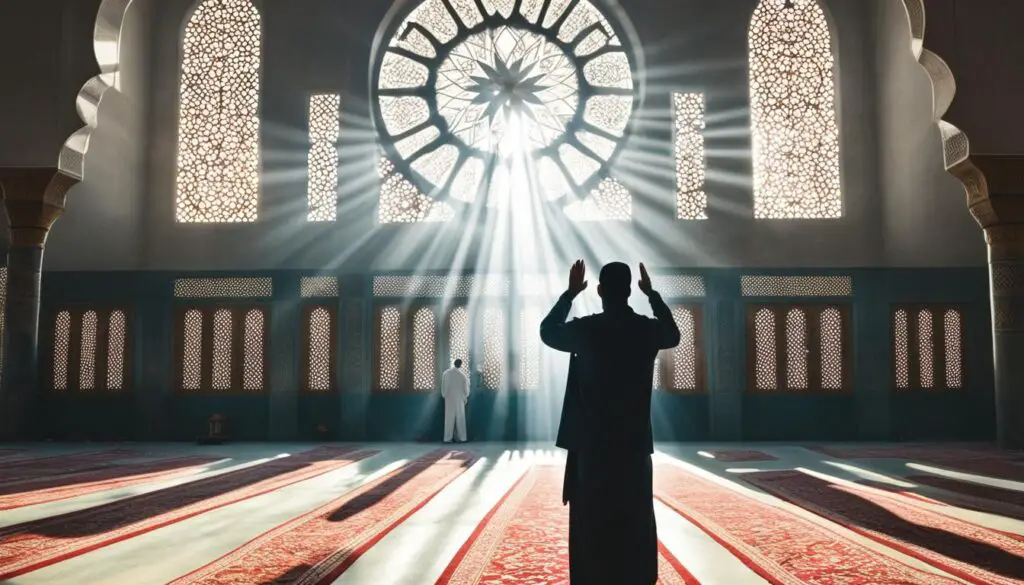
Observing prayer times not only allows Muslims to fulfill their religious obligations but also serves as a continuous reminder of the importance of connecting with Allah throughout the day. It provides structure, discipline, and a spiritual focus amidst the daily activities of life.
The Spiritual and Community Impact of Prayer
Prayer holds a profound spiritual significance within Islamic culture, providing a means for individuals to foster a deep connection with Allah and experience spiritual growth. Through prayer, Muslims have the opportunity to reflect on their relationship with the divine, seek forgiveness, and express gratitude for the blessings in their lives.
However, the impact of prayer extends beyond the individual level. It also plays a vital role in building and strengthening the sense of community among Muslims. Praying together in congregational prayers not only fosters a sense of unity but also creates an environment where individuals can find support, comfort, and solace.
“Prayer is not just an act of worship; it is a means of coming together as a community, sharing our joys and sorrows, and offering support to one another.”
When Muslims gather in mosques or prayer halls to engage in communal prayers, they forge bonds of camaraderie and solidarity. This shared experience of worship and devotion deepens their sense of belonging to a larger community, transcending individual differences such as race, ethnicity, or social status.
Moreover, prayer serves as a powerful source of comfort and hope during challenging times. Whether facing personal struggles or communal crises, the act of prayer instills a sense of peace and reassurance. It reminds Muslims that they are not alone in their trials and that their faith provides them with strength and guidance.
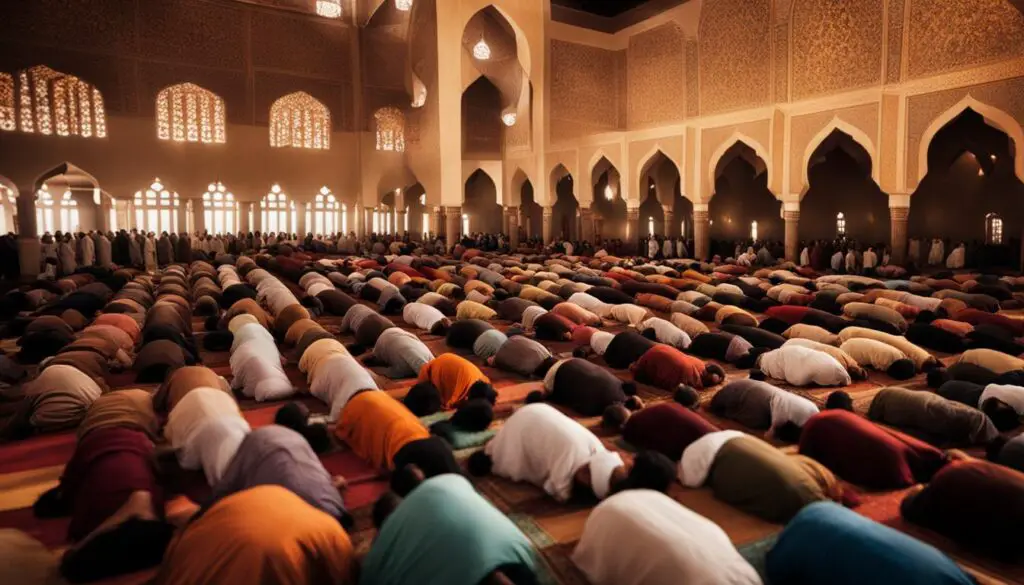
The spiritual benefits of prayer in Islam are manifold. It enables individuals to cultivate a deep connection with the divine, seek guidance, and find solace. At the same time, it fosters a strong sense of community, unity, and support among Muslims, creating an environment where individuals can connect, grow, and thrive.
Spiritual Benefits of Prayer:
- Fostering Spirituality: Prayer allows individuals to cultivate a deeper connection with Allah, enabling them to experience a profound sense of spirituality and inner peace.
- Seeking Forgiveness: Through prayer, Muslims have the opportunity to seek forgiveness for their sins and wrongdoings, promoting personal growth and spiritual purification.
- Expressing Gratitude: Prayer serves as a platform for Muslims to express gratitude for the blessings in their lives, fostering a positive outlook and a sense of contentment.
- Finding Comfort and Support: Praying together in congregational prayers provides comfort and support during difficult times, reinforcing a sense of belonging and community.
Community Impact of Prayer:
- Building Unity: Praying together in congregational prayers strengthens the sense of unity among Muslims, highlighting their shared values, beliefs, and commitment to their faith.
- Supporting One Another: Prayer creates an environment where individuals can find support, share their joys and sorrows, and offer assistance and empathy to those in need.
- Fostering Camaraderie: The act of praying together in mosques or prayer halls fosters bonds of camaraderie and solidarity among Muslims, transcending differences and promoting a sense of togetherness.
In summary, prayer in Islam not only provides spiritual benefits but also fosters a strong sense of community and support. It serves as a powerful tool for individuals to connect with Allah, seek forgiveness, and express gratitude. Additionally, communal prayers strengthen the bonds within the Muslim community, forging unity, camaraderie, and a supportive environment where individuals can find solace and hope.
Prayer Etiquette and Respect in Islamic Culture
In Islamic culture, prayer etiquette holds immense importance as it reflects the reverence and humility with which Muslims approach their worship. Adhering to proper conduct during prayer not only fosters a deeper spiritual connection but also showcases respect for the sacredness of the prayer environment.
When preparing for prayer, Muslims are encouraged to find a clean and suitable space that allows for focus and concentration. This dedication to creating a serene environment demonstrates the commitment to establishing a connection with Allah.
Additionally, dressing modestly and respectfully is crucial during prayer. This means wearing loose-fitting and modest attire, ensuring that the body is adequately covered. By choosing clothing that aligns with Islamic principles of modesty, individuals show reverence and respect for the spiritual act of worship.
To maintain the sanctity of the prayer space, disruptive behavior, loud noises, and unnecessary distractions should be avoided. By cultivating an atmosphere of tranquility, Muslims can fully immerse themselves in prayer and experience the spiritual benefits it offers.
“Let not the voice of men, nor their footsteps disturb you in your prayer to Allah.” – The Quran
Respecting the prayer environment also extends to interacting with others. Muslims are encouraged to refrain from engaging in conversation or any activity that may distract themselves or others from their prayer. It is essential to approach prayer with utmost concentration and prioritize the spiritual connection with Allah.
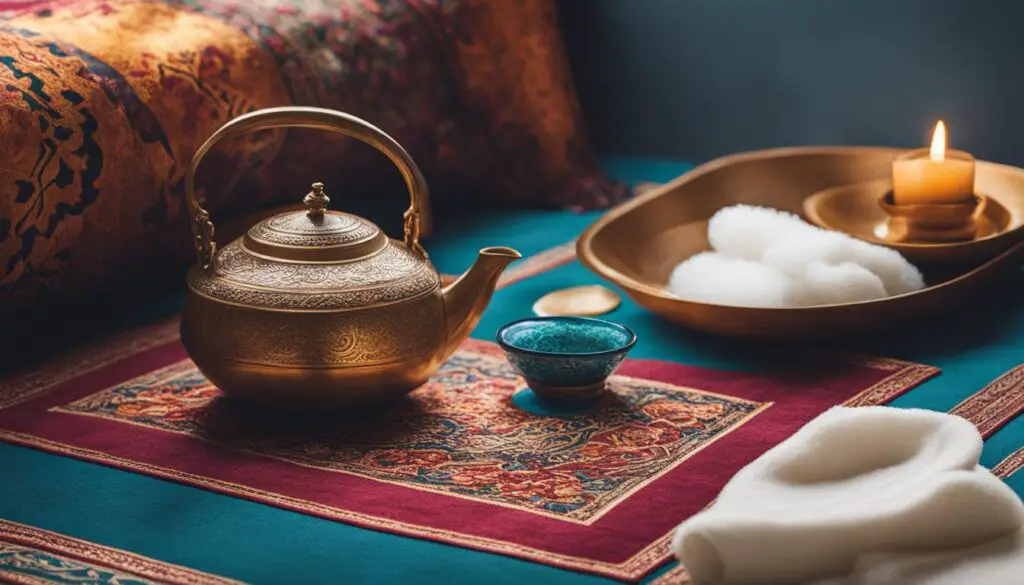
| Prayer Etiquette in Islamic Culture | Respecting the Prayer Environment |
|---|---|
| 1. Find a clean and suitable space for prayer | 1. Refrain from unnecessary distractions |
| 2. Dress modestly and respectfully | 2. Avoid engaging in conversation |
| 3. Maintain focus and concentration | 3. Cultivate a serene and tranquil atmosphere |
The practice of prayer etiquette in Islam reflects the deep respect and reverence Muslims have for their faith and their devotion to Allah. By adhering to these principles, individuals can fully embrace the spiritual benefits of prayer and cultivate a profound connection with the divine.
Prayer in Islamic Culture: Embracing Diversity
Prayer is a central pillar of Islamic culture, bridging the gap between individuals and their Creator. Islamic prayer, while rooted in the core principles of devotion and submission to Allah, embraces diversity by allowing for cultural practices within the framework of Islamic teachings. This inclusivity adds richness and variety to the Islamic prayer experience, celebrating the unique cultural identities of Muslim communities worldwide.
The Beauty of Diversity in Islamic Prayer
In Islamic prayer, diversity is not only accepted but also celebrated. Different Muslim communities may display variations in their prayer styles, clothing choices, and recitations. These cultural practices bring a tapestry of colors and flavors to the prayer experience, highlighting the cultural diversity within the global Muslim ummah (community).
“Islam does not require us to forsake our cultural identities. Instead, it encourages us to embrace them and express our devotion to Allah in ways that resonate with our individual backgrounds.”
Through cultural practices in prayer, Muslims can express their unique identities while adhering to the core principles and rituals of Islamic worship. It is a beautiful testament to the universality of Islam, showing that the message of unity and devotion to Allah transcends cultural boundaries.
Exploring Cultural Practices in Islamic Prayer
When it comes to cultural practices in Islamic prayer, there is a rich tapestry of diversity to be discovered. These practices can encompass various aspects, including clothing choices, prayer styles, and recitations.
- Clothing Choices: Muslim communities around the world may incorporate their traditional attire into their daily prayers. For example, individuals from South Asia may wear shalwar kameez or sarees, while those from the Middle East may wear thobes or abayas.
- Prayer Styles: Different communities may have unique prayer styles that reflect their cultural heritage. For instance, the Indonesian community practices the Tarekat prayer style, which incorporates gentle movements and flowing motions.
- Recitations: The recitation of the Quran during prayer may also vary across cultures. Each community might emphasize particular surahs (chapters) or recite prayers in their native language alongside the original Arabic verses.
These cultural practices contribute to the vibrant tapestry of Islamic prayer, allowing Muslims to connect with Allah through their cultural lens while upholding the values and principles of the faith.
The Essence of Devotion and Unity
While celebrating diversity, Islamic prayer ultimately reinforces the core values of devotion and unity. Regardless of cultural variations, Muslims remain united in their shared goal of submission to Allah and finding solace within their faith.
Embracing diversity in Islamic prayer enriches the prayer experience, strengthens the bonds of the Muslim community, and fosters a sense of appreciation for the different expressions of devotion found within the ummah.
By embracing and respecting diverse cultural practices, Muslims can create a global mosaic of prayer that reflects the beauty and unity of Islamic culture.
Prayer and Cultural Identity in Islam
Prayer in Islam is a powerful practice that not only strengthens the spiritual connection with Allah, but also embraces and celebrates diverse cultural identities. Islam recognizes the importance of cultural heritage and encourages Muslims to maintain their unique customs while aligning them with the principles of Islamic prayer.
Through the integration of cultural identity and Islamic prayer practices, individuals can embark on a spiritual journey that enriches their sense of self and fosters a deep sense of belonging within the global Muslim community. This harmonious blend of traditions allows Muslims to express their devotion to Allah in ways that are meaningful to their cultural background.
Whether it is the variation of prayer attire, the melodies of recitations, or the customs observed before and after prayer, the diversity in prayer practices across cultures within Islam adds depth and richness to the spiritual experience. Each cultural tradition contributes to the tapestry of Islamic prayer, honoring the unique histories and customs of Muslim communities around the world.
By embracing both the Islamic teachings and cultural practices, Muslims can find a balance between their religious obligations and their cultural heritage. This integration not only reinforces a strong cultural identity but also deepens the sense of connection to Allah. It is a testament to the beautiful and inclusive nature of Islam, which embraces the mosaic of cultures that make up the Muslim ummah.
The image above captures the essence of prayer and cultural identity in Islam, showcasing the unity and diversity within the global Muslim community. Just as the image portrays individuals from different cultural backgrounds coming together in prayer, so too does the combination of cultural practices and Islamic teachings within the realm of prayer.
Conclusion
Embracing prayer in Islamic culture is not only a religious obligation but also a transformative experience that encompasses deep spirituality and communal connection. The beauty of prayer in Islam lies in its ability to foster a profound relationship with Allah, enabling individuals to seek guidance, find solace, and experience spiritual growth.
Islamic prayer practices, rituals, and etiquette shape the cultural identity of Muslims worldwide. Through ablution, specific movements, and recitation of Quranic verses, prayer becomes a sacred act of worship and submission to Allah’s will. Adhering to prayer times and embracing congregational prayers further strengthens the sense of community and unity among Muslims.
It is important to recognize and respect the diversity of prayer traditions within Islamic culture. While the core principles remain the same, variations in clothing, styles, and cultural practices add richness and vibrancy to the Muslim prayer experience. Islam encourages the integration of cultural identity and prayer, allowing individuals to preserve their heritage while deeply connecting with their faith.
By embracing prayer traditions and upholding the beauty of prayer in Islam, Muslims can fully immerse themselves in the spiritual journey that prayer offers. Through devotion and respect, individuals can experience the profound impact of prayer on their lives, finding comfort, guidance, and a sense of belonging within the global Muslim community.
FAQ
What is the significance of prayer in Islamic culture?
Prayer holds immense significance in Islamic culture, fostering spirituality and a connection with the divine. It is a form of worship and submission to Allah’s will.
What are the Islamic prayer practices and rituals?
Islamic prayer practices involve ablution, specific movements, and recitation of Arabic prayers from the Quran. Muslims stand, bow, prostrate, and sit during prayer.
When are the Islamic prayer times?
Muslims observe five daily prayers at dawn, mid-day, afternoon, evening, and night. These prayer times vary based on the position of the sun and geographical location.
How does prayer impact spirituality and community in Islamic culture?
Prayer allows individuals to deepen their relationship with Allah, seek forgiveness, express gratitude, and find solace in challenging times. Praying together in congregational prayers strengthens the sense of community and unity among Muslims.
What is the etiquette and respect expected during prayer in Islamic culture?
Islamic prayer etiquette emphasizes focus, humility, and reverence. Muslims are encouraged to find a clean space, dress modestly, and avoid disruption or distractions during prayer.
How does prayer embrace diversity in Islamic culture?
Prayer in Islam embraces diversity, allowing for cultural practices within the framework of Islamic teachings. While the core principles remain the same, different Muslim communities may have variations in styles, clothing, or recitations during prayer.
Does prayer in Islamic culture require individuals to abandon their cultural identity?
No, prayer in Islam recognizes and celebrates diverse cultures. Muslims are encouraged to preserve their cultural heritage while aligning their practices with Islamic teachings, enriching their spiritual journey and sense of belonging.
How does prayer enrich the cultural identity in Islamic culture?
Prayer plays a fundamental role in shaping the cultural identity of Muslims worldwide. By embracing prayer traditions and respecting cultural practices, Muslims experience the beauty and significance of prayer within their cultural context.


